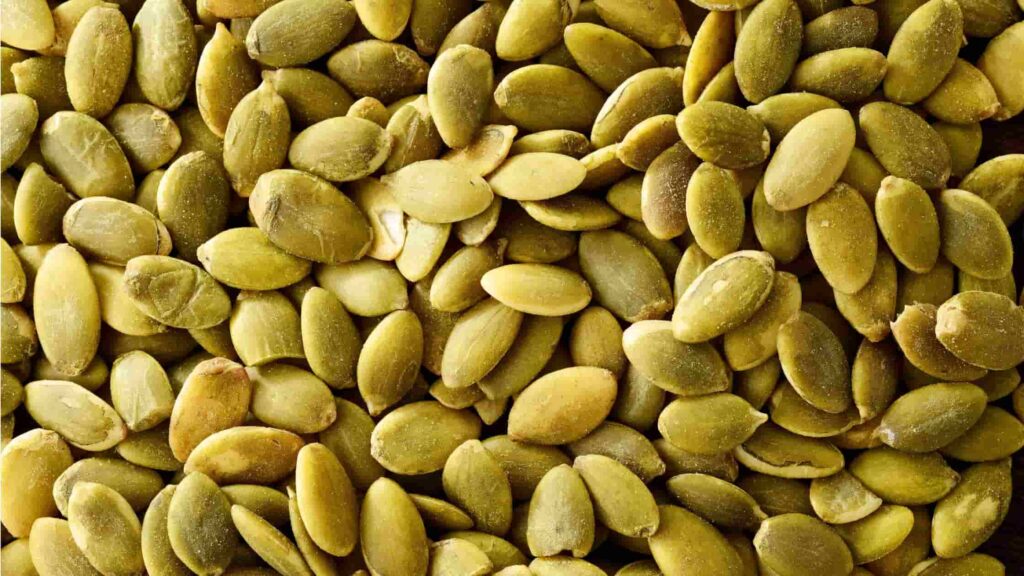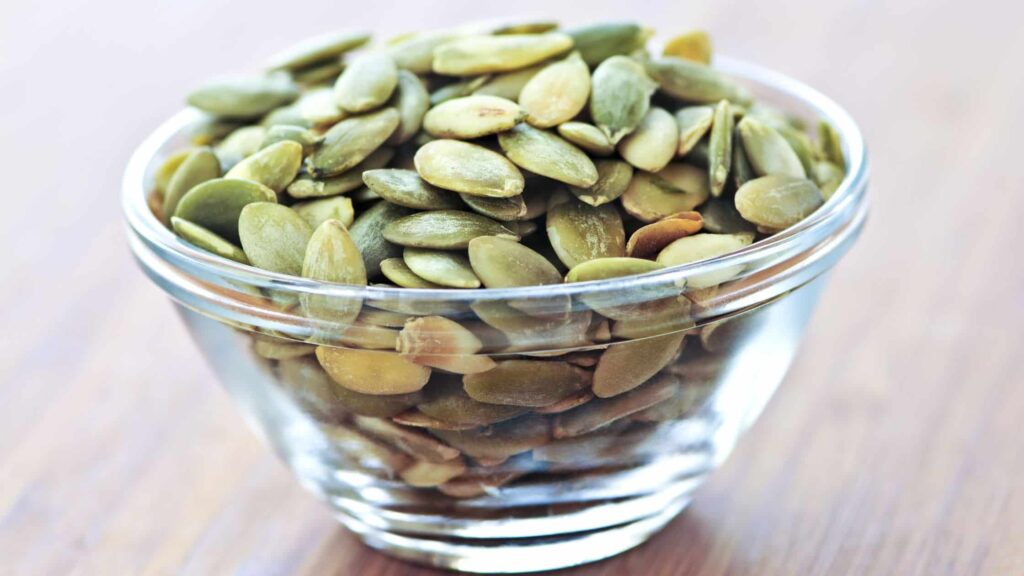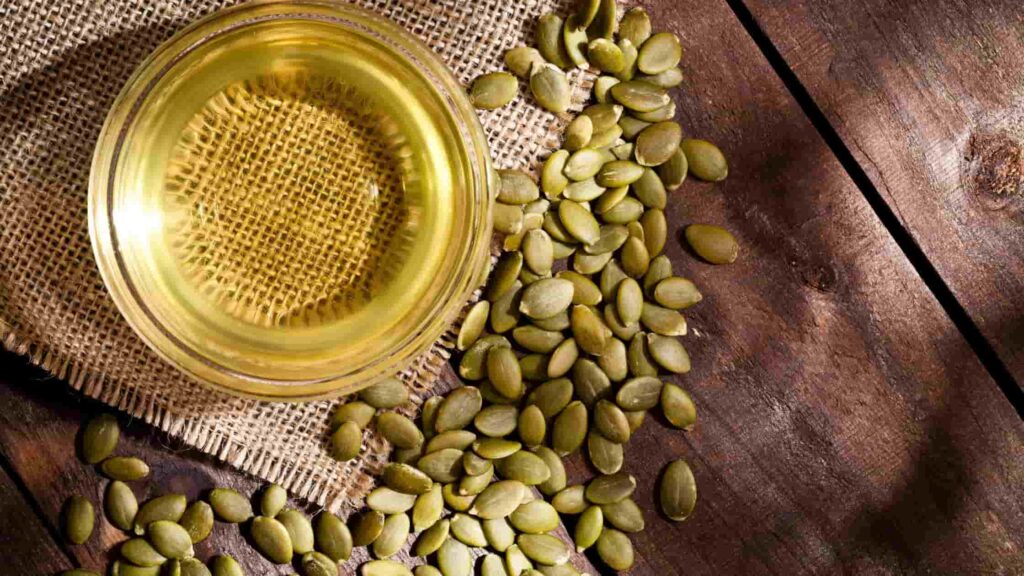I started adding pumpkin seeds to my smoothies daily and noticed improved digestion and deeper sleep within a week. They’ve become a simple, natural boost to my overall health routine.
A nutrient-dense superfood, pumpkin seeds are high in fiber, protein, good fats, and vital minerals like zinc and magnesium. It promotes hormone balance, immunity, heart health, and general well-being.
In this article we discuss about “Pumpkin Seed”
Table of Contents
Introduction:
Pumpkin seeds, often referred to as pepitas, are among the most nutrient-dense plant foods you can add to your diet. They’ve been used for centuries across cultures for their medicinal and nutritional value, and modern science continues to confirm their health benefits.
Whether you’re consuming them raw, roasted, or in oil form, pumpkin seeds pack a punch of vitamins, minerals, antioxidants, and healthy fats. This guide covers everything you need to know—from nutritional facts and health benefits to eating tips and potential side effects.
What Are Pumpkin Seeds?
The flat, oval-shaped seeds of pumpkins and other squash varieties are known as pumpkin seeds. Although they can be consumed with or without their shells, shelled seeds—also known as pepitas—are more practical and frequently utilized.

Origin and History:
- Native to Central and South America, pumpkin seeds date back over 7,500 years to ancient Mexican civilizations.
- Historically used by Native Americans for food and medicine, pumpkin seeds were believed to support urinary and digestive health.
Today, they are recognized worldwide for their therapeutic properties and diverse culinary uses.
Pumpkin Seed Nutrition Facts:
Although they are high in calories, pumpkin seeds are a great source of important nutrients. A 1-ounce (28g) portion of roasted seeds (without shells) has the following nutrients:
| Nutrient | Amount |
| Calories | 126–151 kcal |
| Protein | 5–7 grams |
| Total Fat | 5.5–13 grams (mostly polyunsaturated) |
| Carbohydrates | 9–15 grams |
| Fiber | 1.8–5.2 grams |
| Omega-3 Fatty Acids | ~22 mg |
| Omega-6 Fatty Acids | ~2.5 g |
Rich in Vital Minerals:
Pumpkin seeds are an excellent source of:
- Magnesium – crucial for over 600 body processes
- Zinc – supports immunity, hormone balance
- Phosphorus – important for bone health
- Iron – supports oxygen transport
- Manganese, Copper, Potassium, Calcium – essential for metabolism and cardiovascular function
Top 10 Science-Based Health Benefits of Pumpkin Seeds:
1. High Antioxidant Power:
Pumpkin seeds contain potent antioxidants such as:
- Phenolic acids
- Carotenoids
- Vitamin E
These antioxidants help neutralize free radicals, reduce inflammation, and protect against chronic disease.
2. Prostate and Bladder Health:
Several studies have shown pumpkin seeds help treat benign prostatic hyperplasia (BPH) and overactive bladder.
- A 2022 study on 130 men found 500 mg of pumpkin seed extract twice a day reduced urinary symptoms significantly.
- After just 12 weeks, ladies with hyperactive bladders experienced improvements in their ability to urinate thanks to pumpkin seed oil.
3. Potential Anti-Cancer Properties:
Lab studies suggest pumpkin seed extracts may:
- Inhibit growth of breast and prostate cancer cells
- Trigger apoptosis (cancer cell death)
- Reduce inflammation, a key factor in cancer development
Although human trials are limited, these findings are promising.
4. Enhances Male Fertility:
Pumpkin seeds are rich in zinc, which is linked to:
- Increased sperm quality
- Higher testosterone levels
- Improved reproductive performance
Animal studies show that even chemotherapy-damaged reproductive systems benefitted from pumpkin seed extract.
5. Regulates Blood Sugar:
Thanks to their low glycemic index, magnesium, and fiber, pumpkin seeds help regulate blood sugar spikes, especially after meals.
One long-term study found those with high magnesium intake had a 15% lower risk of type 2 diabetes over 28 years.
6. Improves Sleep Quality:
Pumpkin seeds contain tryptophan, a precursor to melatonin, along with magnesium, zinc, and selenium—all of which promote restful sleep.

- Magnesium reduces stress and improves sleep onset
- Tryptophan helps regulate sleep-wake cycles
- Zinc enhances tryptophan metabolism to melatonin
7. Heart Health and Blood Pressure:
- Magnesium and antioxidants help lower blood pressure
- Omega-3 & Omega-6 fats maintain healthy cholesterol levels
- Nitric oxide produced by pumpkin seeds enhances blood vessel elasticity and circulation
A study of postmenopausal women taking pumpkin seed oil showed a 7% drop in blood pressure and 16% rise in HDL cholesterol.
8. Digestive Support:
A healthy amount of insoluble fiber is provided by whole pumpkin seeds with their shells, which aids in:
- Relieve constipation
- Feed gut bacteria
- Reduce risk of colon cancer
9. Boosts Immunity:
Rich in zinc, iron, and antioxidants, pumpkin seeds support immune function and protect against illness.
10. Supports Bone Health:
Pumpkin seeds are loaded with magnesium, calcium, and phosphorus—all of which are critical for maintaining strong bones, especially in older adults.
How to Eat Pumpkin Seeds:
It’s simple and flexible to incorporate pumpkin seeds into your regular meals.
1. Popular Ways to Enjoy Them:
- Snack on them roasted or raw
- Add to smoothies, protein shakes, or breakfast bowls
- Sprinkle on top of salads, soups, or roasted veggies
- Use in baking for breads, cookies, and muffins
- Mix into granola or trail mix for a healthy crunch
- Blend into hummus, pesto, or dips for added texture and nutrients
Roasting and Soaking Pumpkin Seeds:
1. Homemade Roasting Instructions:
- Scoop seeds from a fresh pumpkin
- Rinse and remove stringy pulp
- Toss with olive oil and seasoning
- Spread on a baking tray
- Roast at 300°F (150°C) for 30–40 minutes
2. Soaking and Sprouting:
Why soak or sprout seeds?
By lowering phytic acid, it prevents absorption by binding to minerals.
Soaking Steps:
- Rinse seeds and place in a bowl
- Add 2–3x water to seed ratio
- Soak 1–4 hours, drain and rinse
- Dry and roast or refrigerate
Sprouting Steps:
- Soak as above
- Rinse and soak again for 8–12 hours
- Wait until seeds begin to bulge
- Use immediately or refrigerate
Portion Control and Calorie Awareness:
Pumpkin seeds are nutrient-dense but also high in calories, which makes portion control essential. A standard serving size is about 1 ounce (28 grams) or roughly ¼ cup, offering 126–151 calories depending on preparation.
Eating large amounts may lead to excessive calorie intake, especially when mixed with other high-fat foods. This can affect weight management efforts even though the seeds are healthy.
Sticking to the recommended portion allows you to enjoy the nutritional benefits—like protein, magnesium, and healthy fats—without overdoing it on calories.
Roasted or salted pumpkin seeds may contain added fats and sodium, so always check labels or roast them at home for better control.
Incorporating them into meals rather than snacking in bulk helps with mindful eating and keeps your daily calorie goals on track.
Potential Side Effects of Pumpkin Seeds:
1. Digestive Issues:
- High fiber intake from shells may cause bloating, gas, or diarrhea, especially in sensitive individuals.
2. Rare Allergic Reactions:
Although uncommon, some people have reported reactions such as:
- Itching or swelling in the throat
- Vomiting or wheezing
- Skin rashes or facial flushing
3. Medication Interactions:
Due to high levels of:
- Vitamin K (may affect blood thinners)
- Magnesium (can interact with diuretics or blood pressure meds)
Consult your healthcare provider if you’re on chronic medication before consuming large amounts.
Pumpkin Seeds Benefits for Female:
For women, pumpkin seeds provide a number of significant health advantages, particularly in relation to reproductive health and hormone balance. They are high in healthy fats, zinc, and magnesium, which promote immune system function, bone strength, and mood management.
Pumpkin seeds include zinc and phytoestrogens that may help control menstrual cycles and lessen the symptoms of PMS. Additionally, the tryptophan content can help with stress management and sleep quality enhancement, two important aspects of women’s health.
During menopause, the magnesium and plant-based nutrients in pumpkin seeds have been linked to reduced hot flashes, improved heart health, and better bladder control.
Pumpkin Seed Kernels:
Pumpkin seed kernels are the green, hulled part of the seed, often called “pepitas.” They are easier to eat, digest, and use in recipes compared to whole seeds with shells.
These kernels are packed with protein, healthy fats, and antioxidants, making them an excellent snack or topping for salads, yogurt, and smoothies.

Because they are shell-free, they contain less fiber than whole seeds but still deliver a rich dose of magnesium, iron, and zinc, supporting energy, muscle function, and immune health.
Frequently Asked Question:
1. Do pumpkin seeds improve sperm?
Indeed, the zinc and antioxidants included in pumpkin seeds increase sperm motility and count. They also support the maintenance of normal testosterone levels.
2. Do pumpkin seeds reduce belly fat?
Because they keep you full, pumpkin seeds’ rich protein and fiber content can help you lose weight. They do, however, function best when combined with exercise and a healthy diet.
3. Are pumpkin seeds male or female?
Pumpkin seeds are plant-based and do not have a gender. However, they offer specific health benefits for both men and women.
4. How to use pumpkin seeds?
You can eat pumpkin seeds raw, roasted, or soaked. They’re great in smoothies, salads, yogurt, or baked goods.
5. What are pumpkin seeds good for males?
Pumpkin seeds help men’s sperm quality, testosterone levels, and prostate health. They also support immunological and cardiac function.
6. Can I eat pumpkin seeds raw?
Yes, raw pumpkin seeds are safe and nutritious. Soaking or sprouting them can enhance digestion and nutrient absorption.
7. Are pumpkin seeds good for periods?
Pumpkin seeds’ zinc and magnesium levels may help lessen PMS symptoms. During menstruation, they also help maintain hormonal balance.
8. Is pumpkin increase testosterone?
Pumpkin seeds may naturally support testosterone levels thanks to their high zinc content, especially in men with deficiencies.
9. What is the best time to eat pumpkin seeds?
The best time to eat pumpkin seeds is in the evening or before bed. They promote better sleep due to tryptophan and magnesium.
10. How many walnuts per day?
For most adults, 4–6 walnuts a day is the recommended amount. They promote heart and brain health and offer antioxidants and good fats.
11. Why are pumpkin seeds so expensive?
Pumpkin seeds are costly due to labor-intensive harvesting, shell removal, and their high nutritional value. Organic and raw versions cost more.
Conclusion:
Pumpkin seeds are a powerful superfood packed with essential nutrients that support everything from heart and immune health to hormonal balance and better sleep. Whether you’re looking to enhance fertility, manage blood sugar, or simply add a nutritious crunch to your meals, pumpkin seeds offer a versatile and science-backed option. With mindful portion control and various ways to enjoy them—raw, roasted, or soaked—they can easily become a daily health booster for both men and women.
